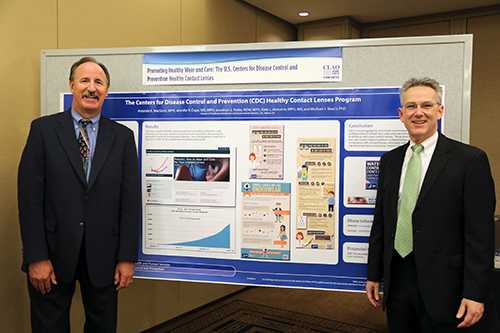CDC at Work: Contact Lenses

Subject matter experts, Rick Weisbarth, OD, and Tim Steinemann, MD, at the Contact Lens Association of Ophthalmologists 2014 Global Symposium.
Research following outbreaks of rare but serious eye infections in the U.S. showed that these types of infections that can lead to blindness occur most often in contact lens wearers who do not take proper care of their contact lenses and cases. This finding signaled to CDC, the contact lens industry, health care providers, and other government and academic partners that action needed to be taken to promote safer contact lens wear and care, and address contact lens hygiene—to prevent serious eye infections, as well as other complications that can cause eye pain and discomfort.
CDC Healthy Contact Lenses Program
CDC worked with the Food and Drug Administration (FDA), eye care providers, contact lens and product manufacturers, and academic partners to develop messages about the healthy wear and care of contact lenses. These messages were incorporated into web content, health education materials, and other efforts to raise awareness about this issue.
With generous financial support from the nonprofit Contact Lens Institute*, we are working toward our goal of helping contact lens wearers reap the benefits of good vision and an active lifestyle while avoiding potentially serious eye infections and other complications.
Vision
Proper hygiene and adherence to contact lens replacement schedules and care recommendations, resulting in reduced eye infections and complications among contact lens wearers.
Mission
To maximize the benefits of contact lens wear and increase awareness of behaviors and risk factors that can affect the eye health of contact lens wearers in the United States through clear and consistent recommendations about proper wear, care, and maintenance of contact lenses.
Subject Matter Expertise
CDC consulted with leading eye health experts in the U.S. across multiple sectors when developing the Healthy Contact Lenses Program and would like to thank these individuals for their feedback:
- Robin Chalmers, OD, FAAO – Contact Lens Assessment in Youth Study, Atlanta, GA
- Jennifer R. Cope, MD, MPH – Centers for Disease Control and Prevention, Atlanta, GA
- Cristina M. Schnider, OD, MBA, FAAO – VISTAKON® Division of Johnson & Johnson Vision Care, Inc., Jacksonville, FL
- Joseph P. Shovlin, OD, FAAO – Northeastern Eye Institute, Scranton, PA
- Thomas L. Steinemann, MD – Case Western Reserve University School of Medicine, Cleveland, OH
- Michelle Tarver, MD, PhD – U.S. Food and Drug Administration, Washington, D.C.
- Jeffrey J. Walline, OD, PhD, FAAO – The Ohio State University College of Optometry, Columbus, OH
- Michael A. Ward, MMSc, FAAO – Emory University School of Medicine, Atlanta, GA
- Rick Weisbarth, OD, FAAO – Alcon Laboratories, Fort Worth, TX
Experts across CDC in parasitic, fungal, bacterial, viral, and chronic diseases, as well as other issues relating to eye health, also provided content and direction for this program.
Professional Organizations
CDC is also partnering with the following organizations:
- The American Academy of Ophthalmology: Research, Regulatory, and External Scientific Relations Committee
- The American Academy of Optometry: Section on Cornea, Contact Lens and Refractive Technologies
- The American Optometric Association: Contact Lens and Cornea Section
- The Contact Lens Association of Ophthalmologists: Scientific Program
- Contact Lens Society of America
- National Academy of Opticianry
*The Contact Lens Institute’s member companies include Alcon®, Bausch + Lomb, CooperVision®, and VISTAKON® Division of Johnson & Johnson Vision Care, Inc.
The Department of Health and Human Services/Centers for Disease Control and Prevention does not endorse any particular company, product, activity, or enterprise.
- Page last reviewed: August 31, 2016
- Page last updated: August 31, 2016
- Content source:


 ShareCompartir
ShareCompartir